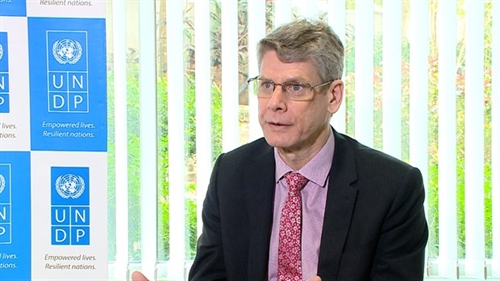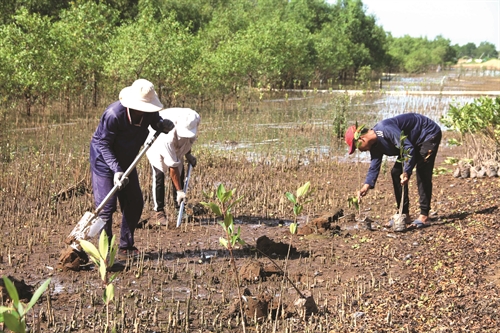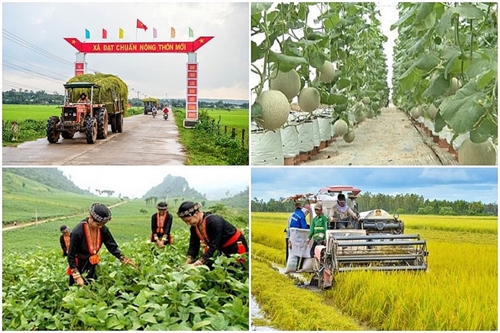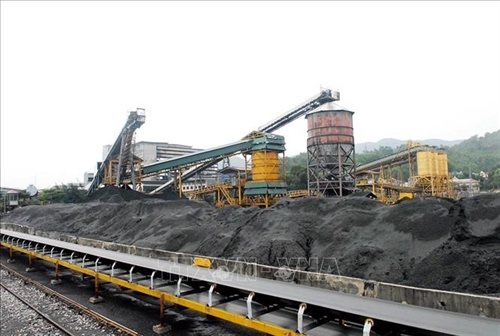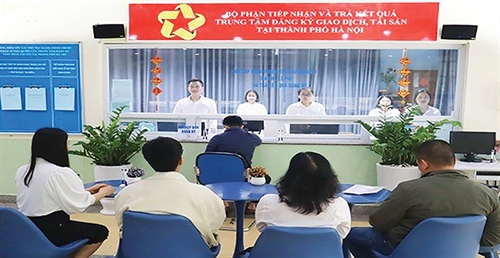 |
| A soldier performing his duties as a navigator, helping a canoe travelling to Da Lat island, Truong Sa archipelago__Photo: VNA |
Lai Thai Binh, Ph.D.
Deputy Director-General, East Sea (South China Sea) Institute, Diplomatic Academy of Vietnam
Many experts in Vietnam and around the world have quite agreed in the past time that despite the concerted efforts of many countries related to the South China Sea (also known as the East Sea in Vietnam), the situation here continues to present many challenges. In that context, Vietnam persisted in its efforts for peace, stability and development in the East Sea as well as continued to call for increased international cooperation regarding the East Sea issue for these purposes.
Recent developments in the East Sea
The East Sea has been the focus of geopolitical tension for many years and continues to witness numerous incidents recently. Various stakeholders, including China, regional countries and international powers, have engaged in a “complicated war” for power, control and access to resources in the region.
Territorial disputes in the East Sea mainly continue to revolve around conflicting claims to the Paracel Islands, Spratly Islands and Scarborough Shoal. China continues to claim almost all of the sea, based on a controversial “nine-dash line” map that overlaps with the exclusive economic zones (EEZs) of several neighboring countries, including Vietnam, the Philippines, Malaysia and Brunei. These countries, along with Taiwan, oppose China’s claims, arguing that they violate the United Nations Convention on the Law of the Sea (UNCLOS).
In recent years, China has significantly increased its military presence in the region, building artificial islands and deploying military assets, including air defense systems and missile installations. This militarization has caused concerns to neighboring countries and the international community, as it has the potential to disrupt stability and freedom of navigation in the region.
In the context of increased great power competition, nationalism emerging strongly in some countries, and local conflicts continuing to take place in some parts of the world and showing no signs of stopping soon, etc., the continuation of certain field activities as mentioned above can turn the East Sea and the region into a new hotspot. China’s imposition of a fishing ban in the area, expanding its scope of activities to large seas, has been strongly opposed by regional countries due to violations of sovereign rights and traditional fishing grounds, raising tensions and concerns about the sustainability of fish stocks and marine ecosystems in the region.
Besides traditional security issues, many non-traditional security issues are also emerging in the East Sea. The mayhem of the supply chain comes as the Covid-19 pandemic impacts companies’ operations, with sudden shortages of essential consumer goods and factory closures that lead to disruptions of goods flow. The sudden increase in cargo demand during the epidemic period also caused shipping activities to be overloaded and ports congested. The increase in transnational crimes such as smuggling, piracy, etc., in the East Sea continues to occur because countries lack the usual resources to control or coordinate between countries inside and outside the region. Coastal countries still have to cope with sea level rise, climate change, deterioration of the marine environment or decline of fish stocks in both quantity and quality, etc.
Diplomatic efforts to resolve disputes in the East Sea as well as address non-traditional security challenges are ongoing, but progress is slow and mostly inconclusive. The Association of Southeast Asian Nations (ASEAN) has played a central role in facilitating dialogue and promoting a Code of Conduct (COC) among the claimant states. However, the negotiations were challenging due to different interests, power asymmetries and different interpretations of international law.
The occurrence of important geopolitical events in the world, including hotspots, and the negative impacts of the Covid-19 pandemic also aroused interest in the East Sea and limited opportunities for cooperation. The effect is quite large and it almost takes a long time to return to the previous state of interest and cooperation. Recently, interest in the East Sea related to the United Nations frameworks has also calmed down, perhaps partly showing that countries are more distracted before many other stressful events in the world.
Vietnam’s endeavors for peace, stability and development in the East Sea
Political and diplomatic measures
In the context of complicated territorial disputes and geopolitical tensions in the East Sea, Vietnam steadfastly pursues a proactive approach to maintain peace, stability and promote development in the region. The country has actively participated in diplomatic initiatives to resolve disputes in the East Sea. As a member of ASEAN, Vietnam has always been a strong supporter of a rules-based order and peaceful resolution of conflicts. It has always emphasized the importance of compliance with international law, especially the UNCLOS, which serves as the basis for settling disputes at sea. In addition to strictly implementing the Declaration on the Conduct of Parties in the East Sea (DOC), Vietnam backs the early achievement of a COC to establish a framework for managing and preventing conflicts. The country’s efforts aim to ensure that the COC is legally binding, effective, and in line with international law.
Vietnam has also played an important role in promoting dialogue among the claimant states and enhancing regional cooperation. It continues to participate in hosting various international forums, including the ASEAN Regional Forum (ARF) and the Expanded ASEAN Defense Ministers Meeting (ADMM+), where stakeholders have the opportunity to discuss and resolve the East Sea issue.
At the same time, Vietnam continues to actively build partnership and strengthen defense cooperation with like-minded countries both inside and outside the region to promote maritime security, freedom of navigation and regional stability. The country always strives to strengthen trust-building, promote dialogue and cooperation, and stabilize relations between major countries, without affecting the region’s common development goals and efforts, creating a foundation for sustainable and lasting peace.
Economic development efforts
Besides political and diplomatic measures, Vietnam pays great attention to economic development in the East Sea. The country promotes foreign investment and initiates projects for offshore oil and gas exploration, fishing and marine tourism. These initiatives not only contribute to Vietnam’s economic growth but also offer opportunities for regional cooperation and cohesion.
In addition, Vietnam has made not a few proposals for the common interest of developing countries, especially regulations related to capacity building and marine technology transfer, contributing to reaching consensus on the international agreement on the conservation and sustainable use of marine biodiversity of areas beyond national jurisdiction (BBNJ) in 2023.
Vietnam is also one of the leading countries in the world in combating plastic waste, one of the biggest threats to the world’s oceans, which has been destroying socio-economic activities at sea and in coastal areas such as tourism, fishing and transport, environmental protection, biodiversity and marine fish resources, human health and safety, etc. Along with a number of other countries, Vietnam is working to forge a global agreement on the issue.
Implications for international cooperation in the future
Vietnam’s attempts to maintain peace, stability and development in the East Sea are of great significance in the region. By supporting a rules-based order and diplomatic initiatives, Vietnam has helped shape the discourse surrounding disputes and highlighted the importance of international law in resolving conflicts. The country’s commitment to peaceful and cooperative solutions has earned respect from the international community and strengthened its diplomatic position.
However, there remain many challenges in Vietnam’s pursuit of peace and stability in the East Sea. China’s assertive actions, including the construction of artificial islands and the militarization of the area, pose a significant obstacle to the efforts toward peace and stability. The asymmetry of powers among nations also limits regional countries’ ability to assert their legitimate claims and defend their interests effectively. Furthermore, the slow progress in the binding COC negotiations has perpetuated uncertainty and potential escalation in the region.
Therefore, the international community and regional countries should:
(i) Continue to promote diplomatic engagement and multilateral dialogue to promote peace and stability in the East Sea. Countries should take advantage of regular summits, ministerial-level meetings and working groups to discuss the East Sea issue, promote mutual understanding and build trust among relevant parties. Also, commitment to open and transparent dialogue is critical to resolving differences and preventing conflicts in the region;
(ii) Prioritize preventive diplomacy to manage and de-escalate conflicts. Early warning mechanisms, crisis management processes, and hotlines between relevant authorities can help facilitate timely communication and prevent misunderstandings that lead to confrontation. In addition, mediation efforts by neutral third parties or prestigious international organizations can be exploited to resolve disputes when a diplomatic deadlock arises; and,
(iii) Promote economic cooperation in the East Sea to create a catalyst for peace, stability and development. Countries should take up opportunities to explore and exploit common resources, manage fisheries activities and develop renewable energy sources, protect the environment and promote sustainable development. Moreover, collaborative projects that address marine pollution, promote marine biodiversity conservation, and combat illegal, unreported and unregulated fishing can help preserve the biological balance of the East Sea.-





